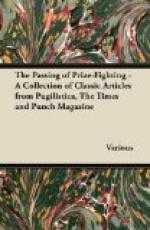Wearing a jacket suit of Navy blue, and escorted by Lord EDMUND TALBOT and Mr. RAWLINSON, the new FIRST LORD OF THE ADMIRALTY walked up the floor to take the Oath. Members noted with satisfaction the buoyancy of his step and the firmness of his chin. If looks go for anything the Navy in his hands will not relax the bull-dog grip upon the enemy that it has maintained these three years.
[Illustration: THE “SHEE-BILLING” AUTUMN WEAR FOR MEMBERS—AND POLICEMEN—OF THE HOUSE OF COMMONS.]
Asked whether the Government proposed to institute a prosecution in regard to the disturbance of the peace (with alleged profane language) that recently occurred within the precincts of the Palace of Westminster, Sir GEORGE CAVE gravely recited the words of the statute providing that an offender in such circumstances was liable to have his right hand stricken off. All eyes instinctively turned to see how Mr. PEMBERTON-BILLING was taking it; but any anxiety that he may have felt was relieved when the HOME SECRETARY added that the statute in question was repealed in 1828.
A question put by Sir HENRY CRAIK about a C1 recruit included the statement that he was “suffering from Addison’s disease”; and Mr. HOGGE voiced the general curiosity when he asked, obviously out of solicitude for the late Minister of Munitions, “What is ADDISON’S disease?” It is believed that the reply, if one had been given, would have been “Over-dilution.”
Good progress was made with the Corn Production Bill, and on the vexed question as to how far allowances should be reckoned as part of the minimum wage an amendment was inserted enabling the Wages Boards to secure for the labourer a little more in cash and less in kind.
In the Lords a satisfactory account of the recent negotiations between British and German Commissioners at the Hague was given by Lord NEWTON. Incidentally he disposed of the suggestion that there had been anything in the way of fraternization. Both sides had held strictly to the business in hand, which was the exchange of prisoners, not of compliments.
Wednesday, August 1st.—The Peers were to have had another field-day, for Lord SELBORNE had put down a motion calling attention to the alleged sale of honours. But, to the relief of certain of the recently ennobled, who could not be sure what the Unnatural History of SELBORNE might contain, the discussion was postponed.
Three hours’ talk over Mr. HENDERSON’S dual personality left the Commons still vague as to how a Cabinet Minister becomes a Labour delegate at will. Perhaps the Channel passage may have had something to do with it.
* * * * *
[Illustration: ANY PORT IN A STORM.]
* * * * *
THE PICTURE POSTCARDS.




